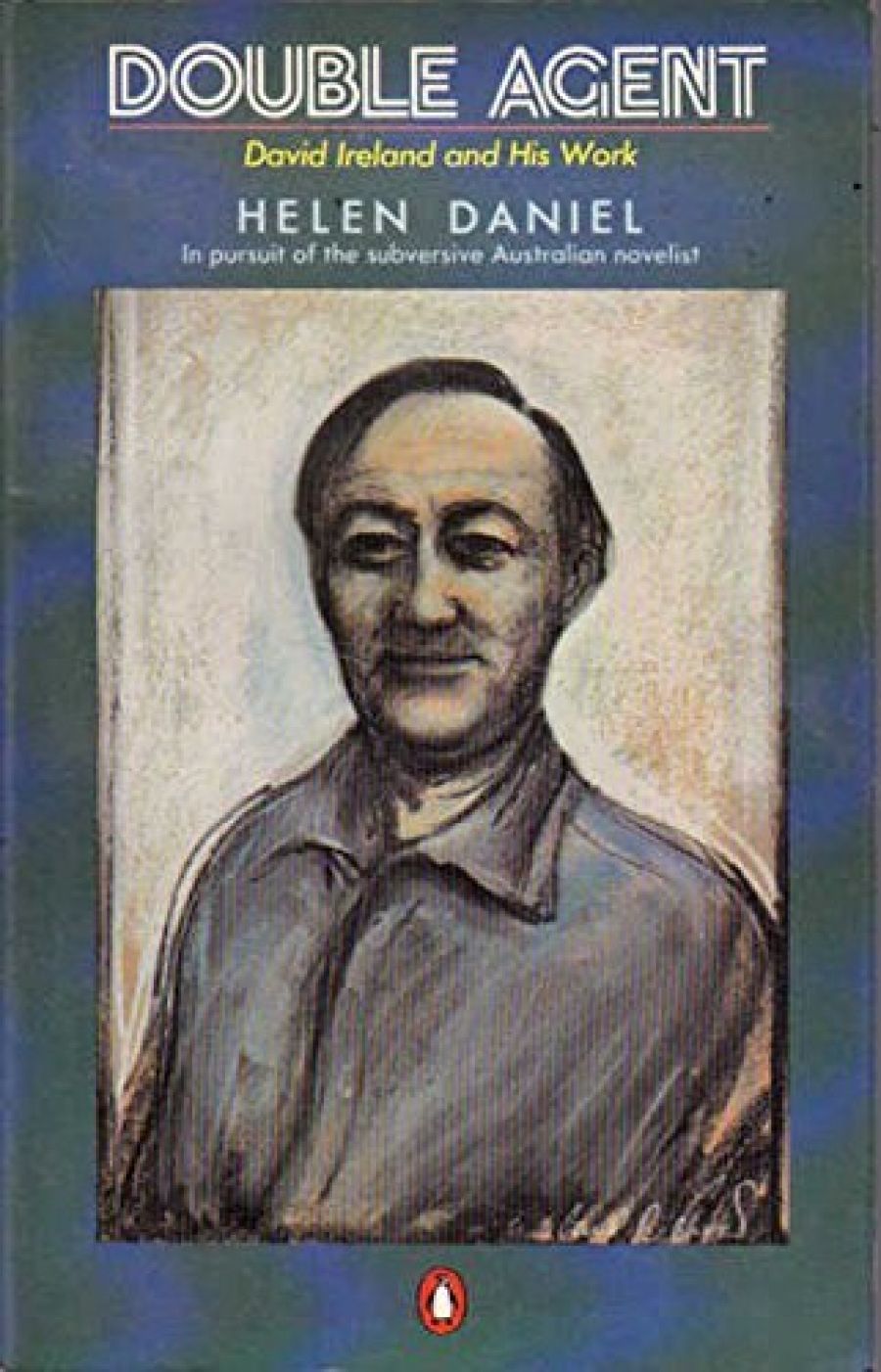
- Free Article: No
- Contents Category: Literary Studies
- Review Article: Yes
- Article Title: In the eye of the beholder
- Online Only: No
- Custom Highlight Text:
Penguin’s publication of Helen Daniel’s critical book on the fiction of David Ireland is their first venture into Australian criticism, and one which I hope will be the beginning of a series on Australian writers.
David Ireland is an obvious choice for the launching of such a venture. As Daniel points out, he does not have the international reputation or readership of White or Keneally; she seems to suggest that this is because he is a far more ‘adventurous’ and ‘elusive’ writer. He has always been a controversial author in Australia, winner of many major awards, placed on some school/university reading lists, while barred as ‘obscene’ by other institutions.
- Book 1 Title: Double Agent
- Book 1 Subtitle: David Ireland and his work
- Book 1 Biblio: Penguin, $6.95 pb
I must admit that I have never been an avid fan of Ireland’s fiction, and Helen Daniel does little to convince me of the error of my stance. Although my criticism of Ireland does not match Professor Colin Roderick’s condemnation of at least one novel (A Woman of the Future) as literary sewerage. I do not the puerile, beer-swilling bonhomie, the male chauvinism (to use a tired but apt phrase), the ghastly ocker voice which emanates from all the novels. Daniel does not convince me that this voice is a criticism of the above stance; rather her uncritical adulation of Ireland tends to reinforce my suspicion that Ireland secretly admires many of the things/people which he ostensibly attacks.
This adulation of Ireland and his works is what I find most disturbing about Daniel’s book. Of course, a critic may be admiring of her subject, but surely not the point of uncritical acceptance of the given. Daniel nowhere seems to be able to distance herself from the fiction and makes far too close an association between the writer and the characters he portrays. Thus at the conclusion of the book she asserts that:
He (Ireland) distributes himself through the populace, splintering himself off into his characters, each one a component of himself. So Ireland is Great White Father. He is also Gunner … He is Meat man … And he is the narrator of The Chantic Bird … He is Billie, founder of the City of Women … And he is Alethea.
The opening chapter entitled ‘In Pursuit of David Ireland’, illustrates the chief concerns of, and problems with Daniel’s book. The chapter title builds on and explicates the subtitle of the book, ‘In pursuit of the Subversive Australian Novelist’, and puts forward Daniel’s thesis that Ireland is elusive, subversive, always retreating from the reader, and from the characters, so that there is no clear authorial voice, no adherence to ‘convention’. This is a viewpoint, but it is repeated ad nauseam throughout the book; not only is Ireland ‘elusive’ and ‘subversive’ but most of the characters are described in these terms. Daniel describes her first experience of Ireland’s work:
I came innocently to my first experience of David Ireland’s work, straight from the conventional novel, with humble expectations of a sequential narrative line, characters whom I would know personally and some orderly social setting where a few characters and I would find a place … If life is chaotic, in the novel it becomes ordered and intelligible, not always to our liking, but it makes sense … Plots progress. Characters are companionable. Writers show us the way.
This chatty tone is continued throughout the book, at times tediously. But more irritating is the breathlessness of the above paragraph, and one wants to ask, ‘What about the works of Furphy, Mathers, Garcia Marquez, Barthelme, Mishima, any number of African writers like Tutuola, Beti?’ Surely Ireland is but one of a horde of international writers who do not conform to some so-called conventional form?
I enjoyed the chapter on Burn, possibly because we are no longer pursuing Ireland and his characters through some ‘elusive thesis’, for Daniel sees this novel as ‘not a move towards the new concern … but an interlude in Ireland’s work’. The two chapters which I found most irritating were those on A Woman of the Future and City of Women. In these again adulatory critiques, Daniel does not mention the predominantly male voice which directs and forms the ‘female’ characters of Alethea and Billie, so that they become fantasy-females, their characterisation underlined by violence, aggression, and sadism. It is interesting that a recent male critic of Ireland (Peter Elkin in Who is She?), very clearly sees the maleness of these characters and the hostility of the author towards them.
Despite all this, Daniel has made a valuable contribution to Australian literary criticism and in a difficult area in that Ireland is very much an author whom one either loves or detests. The book is readable, if at times coy. Objectively it is an impossibility for any critic, but I feel that Daniel’s book would have been a better critique had she distanced herself more fully from the fiction and, more importantly, from the constraints of her thesis as subterfuge.


Comments powered by CComment